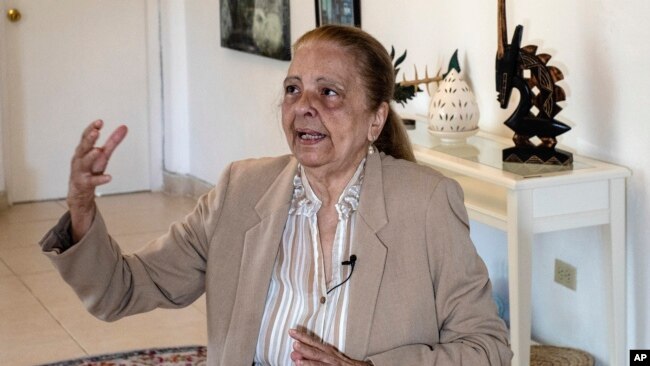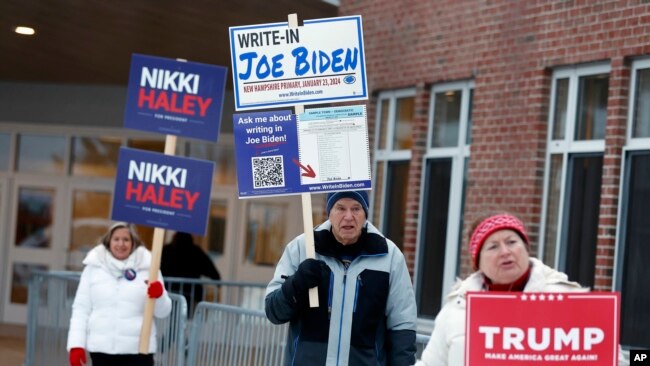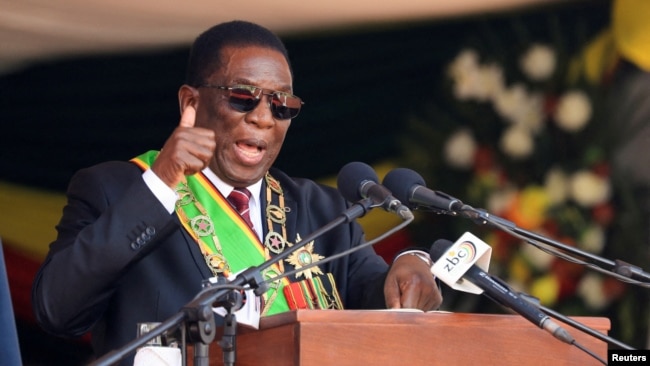양안 긴장이 고조되면서 적응하는 대만 농민들
Taiwanese Farmers Adapt as Cross-Strait Tensions Grow
페이지 정보
작성자 William Yang 작성일 24-01-09 10:55 댓글 0본문
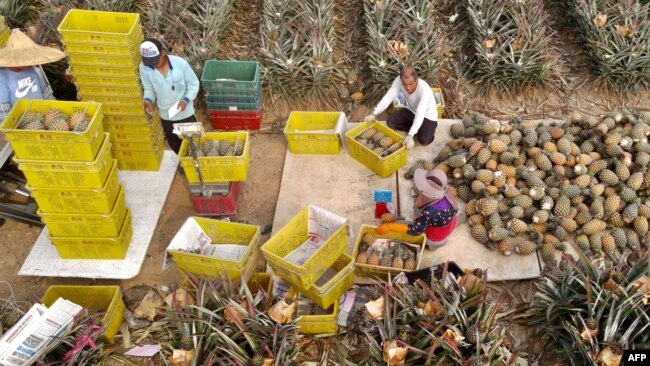
파일 - 2021년 3월 16일 핑둥현에서 농부들이 파인애플을 수확하고 있습니다. 중국이 중국 시장에 크게 의존하는 몇몇 대만 과일의 수입을 금지함에 따라 지난 2년 동안 많은 대만 과일 농부들이 딜레마에 직면했습니다.
FILE - Farmers are seen harvesting pineapples in Pingtung county, March 16, 2021. Many Taiwanese fruit farmers have faced a dilemma over the past two years, as China banned imports of several Taiwanese fruits that rely heavily on the Chinese market.
타이완 타이베이 —
Taipei, Taiwan —
대만 타이퉁 현에 사는 61세의 아테모야 농부 Tou Yun-shing에게 지난 2년은 그의 사업에 있어서 힘든 시간이었습니다.
For 61-year-old atemoya farmer Tsou Yun-shing in Taiwan’s Taitung County, the last two years have been a tough time for his business.
중국이 2021년 9월 대만에서 모야 수입을 금지한 이후 수입이 절반으로 줄었고 대체 시장을 찾아야 했습니다.
Since China banned the import of atemoyas from Taiwan in September 2021, his revenues have been slashed in half and he has had to look for alternative markets.
금지령 이전에, 제 아테모야의 약 80%에서 90%가 중국에 팔렸습니다. 하지만 그들이 대만 아테모야의 수입을 금지했기 때문에, 저는 대만에서 다른 판매 채널을 통해 아테모야를 판매하기 시작해야 합니다."라고 대만 동부의 타이퉁 현에 있는 그의 넓은 과수원에서 한 인터뷰에서 그는 VOA에 말했습니다.
“Before the ban, around 80 to 90% of my atemoyas were sold to China. But since they banned the import of Taiwanese atemoyas, I have to start selling my atemoyas through different sales channels in Taiwan, hoping to at least even the costs,” he told VOA during an interview at his sprawling orchards in Taitung county in eastern Taiwan.
차우는 자신의 아테모야를 국내 시장으로 재배하는 것 외에도 아테모야의 수를 줄이고 구아바와 같이 대만에서 더 인기 있는 다른 과일을 재배하기 시작했습니다.
In addition to redirecting his atemoyas to the domestic market, Tsou also reduced the number of atemoyas he grows and started growing other fruits that are more popular in Taiwan, such as guava.
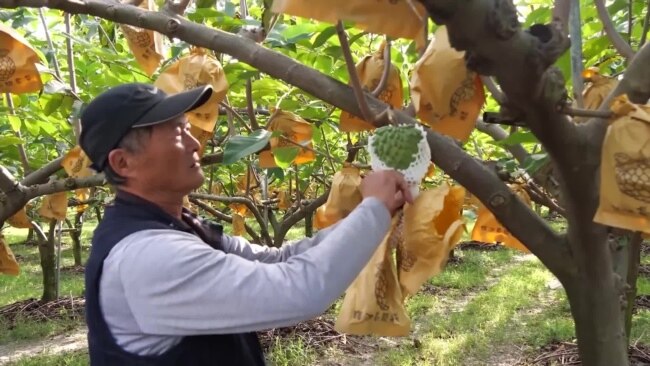

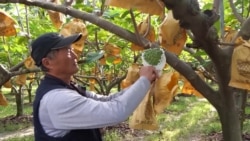
공유 포함
Embed share
투표 앞두고 양안 긴장에 휩싸인 대만 과수농가들
Ahead of Vote, Taiwan Fruit Farmers Caught in Cross-Strait Tensions
공유 포함
Embed share
코드가 클립보드에 복사되었습니다.
The code has been copied to your clipboard.
폭 px 높이 px
width px height px
페이스북에 공유하기
트위터에 공유하기
URL이 클립보드에 복사되었습니다
The URL has been copied to your clipboard
현재 사용 가능한 미디어 소스가 없습니다
No media source currently available
0:00 0:02:31 0:00
0:00 0:02:31 0:00
다운로드
Download
240p | 7.2MB
360p | 12.1MB
480p | 23.9MB
720p | 39.0MB
1080p | 66.8MB
중국시장
China markets
Tsou는 혼자가 아닙니다. 그의 경험은 중국이 파인애플, 밀랍 사과, 아테모야를 포함하여 중국 시장에 크게 의존하는 몇몇 대만 과일의 수입을 금지함에 따라 지난 2년 동안 많은 대만 과일 농부들이 직면한 딜레마를 반영합니다.
Tsou is not alone. His experience reflect a dilemma many Taiwanese fruit farmers have faced over the past two years, as China banned imports of several Taiwanese fruits that rely heavily on the Chinese market, including pineapples, wax apples and atemoyas.
대만 정부는 파인애플과 같은 과일로 일부 농부들이 직면한 잠재적인 손실을 중화하기 위해 일본과 같은 대체 시장을 찾는 것을 도울 수 있었지만, 아테모야 농부들의 중국 시장에 대한 과도한 의존은 해결책을 찾는 것을 더 어렵게 만듭니다.
While the Taiwanese government has been able to help some farmers, with fruits such as pineapples, find alternate markets like Japan to neutralize the potential losses they face, the heavy reliance of atemoya farmers on the Chinese market makes finding a solution more difficult.
대만 남부 가오슝시에서 가진 인터뷰에서 라이시야오 치젠채소과수협 회장은 "중국이 대만산 메야를 중국 시장에 진출시킬지 여부에 대한 불확실성이 있기 때문에 일부 농부들은 중국 시장에 대한 의존도를 줄이기 위해 카스타드 사과, 아보카도, 열정 과일, 과바 등 다른 과일을 재배하는 것으로 전환했다"고 말했습니다.
“Since there is uncertainty about whether China would let Taiwanese atemoyas enter the Chinese market or not, some farmers have shifted to growing other fruits, such as custard apples, avocados, passion fruits and guavas, to reduce their reliance on the Chinese market,” Lai Xi-yao, chairman of Chi-Gen Vegetable and Fruit Co-operative, told VOA in an interview in the southern Taiwanese city of Kaohsiung.
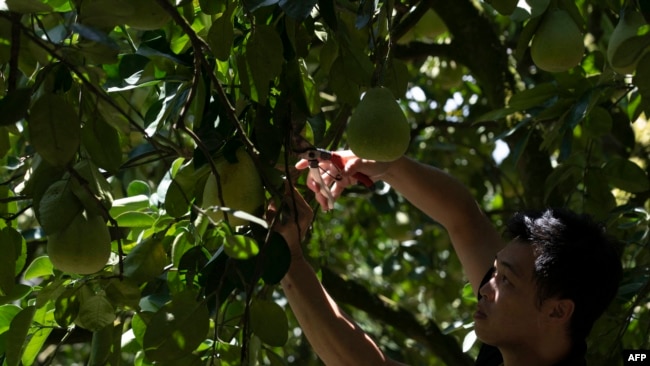
파일 - 포멜로 농부 물린 오(Mulin Ou)가 8월 대만 화롄(Hualien)현 루이수이(Ruisui)시에 있는 과수원에서 나무를 다듬고 있습니다
FILE - Pomelo farmer Mulin Ou is seen trimming a tree at his orchard in Ruisui township, in Taiwan's Hualien county, Aug. 17, 2022.
그가 보기에, 중국이 특정 대만 농산물을 중국 시장에 대량으로 허용하려는 의도는 대만 농부들의 "마음을 사로잡고" 특정 종의 과일이나 어업을 재배하는 대만의 전문 지식을 획득하려는 시도입니다.
In his view, China’s intention to allow large amounts of specific Taiwanese agricultural products into the Chinese market is an attempt to “win over the hearts and minds” of Taiwanese farmers and acquire Taiwan’s expertise in growing certain species of fruits or fisheries.
"베이징이 대만 농부들이 중국에 제품을 수출하기를 원할 때, 그들은 농부들이 요구하는 어떤 것에도 동의할 것이지만, 일단 그들이 특정 종의 과일을 재배하는 방법에 대한 노하우를 얻게 되면, 그들은 대만으로부터의 수입을 차단하기 시작할 것입니다"라고 라이는 말했습니다.
“When [Beijing] wants Taiwanese farmers to export their products to China, they will agree to whatever requests the farmers have but once they acquire the know-how about how to grow certain species of fruits, they will start blocking the imports from Taiwan,” Lai said.
그는 중국 당국이 대만산 농산물의 수입을 금지하기 위해 어떤 변명도 할 수 있기 때문에 중국과의 농산물 무역은 "정상적인 것"이 아니라고 말했습니다.
He said the agricultural trade with China is not “normal” because Chinese authorities can use any excuse to ban imports of Taiwanese agricultural products.
그는 미국의소리(VOA) 방송과의 인터뷰에서 "이런 금지령들은 모두 정치적 요소를 내포하고 있는 것이 분명하다"고 말했습니다.
“It’s obvious that these bans all have political elements behind them,” he told VOA.
양안 관계를 담당하는 중국 공산당 대만사무판공실은 지난 달 발표한 대만산 그루터기 수입금지 조치 종료 발표 성명에서 대만해협 양측이 1992년 합의를 준수하는 한, 대만의 야당인 국민당은 양측이 하나의 중국이 있다는 데 합의하고, 각각 무엇이 무엇인지를 자유롭게 규정할 수 있으며, 대만의 독립을 반대하는 것은 양측이 하나의 가족이며, 몇몇 대만 농산물에 대한 수입금지 조치를 언급하면서 "가족 문제는 논의되고 해결될 수 있다"고 말했습니다.
In a statement announcing the end of the import ban on Taiwanese groupers released last month, the Chinese Communist Party’s Taiwan Affairs Office, which handles cross-strait relations, said as long as both sides of the Taiwan Strait adhere to the 1992 Consensus, a compromise agreement that Taiwan’s opposition Kuomintang interprets as the two sides agreeing there's one China, with each free to define what that is, and oppose Taiwan independence, the two sides are one family and "family matters can be discussed and resolved,” referring to import bans on several Taiwanese agricultural products.
특정 대만 농산물의 중국 시장 의존도를 이용해 대만 정부에 압력을 가하는 것 외에도 중국은 1월 13일 대만 총통 선거와 총선에 영향을 미치기 위해 일련의 강압적인 경제 조치를 쏟아냈습니다. 1월 5일 대만 언론 자유시보와의 인터뷰에서 천치엔젠 대만 총리는 중국의 12개 대만 석유화학 제품에 대한 관세 인하 중단 결정은 경제적이라기보다는 정치적인 것이라고 말했습니다.
Apart from leveraging certain Taiwanese agricultural products’ reliance on the Chinese market to impose pressure on the Taiwanese government, China has unleashed a series of coercive economic measures to influence Taiwan’s presidential and legislative elections on January 13. During an interview with Taiwanese media Liberty Times on January 5, Taiwanese Premier Chen Chien-jen said China’s decision to suspend tariff reduction on 12 Taiwanese petrochemical products is of political rather than economic nature.
최근 가져오기 작업
Recent import actions
중국은 최근 몇 주 동안 대만산 석유화학제품 12종에 대한 관세인하 조치를 중단하는 한편, 중국시장 수출에 크게 의존하던 어패류와 대만산 어패류에 대한 수입금지 조치를 부분적으로 해제했습니다. 공산당 대만사무판공실은 지난달 발표한 성명에서 대만 집권 민진당이나 민진당이 타이베이와 중국간 경제협력기본협정의 조항을 위반하고 양안의 경제교류와 협력을 악랄하게 방해하는 장애물을 설치하고 있다고 비난했습니다.
In recent weeks, China has partially lifted import bans on groupers, a fish that used to rely heavily on export to the Chinese market, and atemoyas from Taiwan, while suspending tariff reductions on 12 Taiwanese petrochemical products. In a statement released last month, the Communist Party’s Taiwan Affairs office accused Taiwan’s ruling Democratic Progressive Party or DPP of violating articles in the Economic Cooperation Framework Agreement between Taipei and Beijing and install obstacles to viciously disrupt cross-strait economic exchange and cooperation.
대만 당국은 선거를 앞두고 중국 정부가 무역 문제를 정치화하고 있다고 비판하고 영향을 최소화하기 위해 영향을 받는 산업들과 협력하겠다고 약속했습니다. 화요일 저녁, 중국 상무부는 농업, 수산업, 기계, 자동차 부품, 섬유 등 대만산 여러 제품에 대한 관세 양허를 추가로 중단하는 방안을 검토하고 있다고 밝혔습니다. 이에 대해 대만 무역협상국은 "대만 선거에 개입하기 위해 경제적 강제력을 사용하는 것을 즉각 중단하라"고 촉구했습니다
Taiwanese authorities have criticized Beijing for politicizing trade issues ahead of the election and promised to work with affected industries to minimize the impact. On Tuesday evening, China’s commerce ministry signaled that it’s considering to further suspend tariff concessions on several products from Taiwan, including agriculture, fishery, machinery, auto parts and textiles, according to a statement posted on its website. In response, Taiwan’s Office of Trade Negotiations urged Beijing to “immediately stop using economic coercion to try to interfere in Taiwan’s election.”
중국이 제기하는 도전에 적응하기 위해, 대만 당국은 농부들이 중국 시장에 대한 의존도를 줄이고 일본과 한국과 같은 대체 시장으로 그들의 제품을 옮기도록 돕기 위해 노력합니다.
To adapt to the challenges posed by China, Taiwanese authorities try to help farmers reduce their reliance on the Chinese market and redirect their products to alternative markets like Japan and South Korea.
대만 농업부의 자료에 따르면, 중국은 2022년 대만 과일 수출의 12.9%를 차지했는데, 이는 2018년의 22.9%보다 감소한 수치입니다. Tsouin Taitung은 대체 시장을 찾는 것 외에도 정부가 그와 같은 체리모야 농부들이 2년 금지령에서 살아남을 수 있도록 돕기 위해 다양한 종류의 보조금을 제공했다고 말했습니다.
According to data from Taiwan’s Ministry of Agriculture, China accounted for 12.9% of Taiwan's fruit exports in 2022, down from 22.9% in 2018. Apart from looking for alternative markets, Tsou in Taitung said the government also provided different types of subsidies to help cherimoya farmers like him survive the two-year ban.
그는 VOA에 "대만 당국은 다양한 종류의 보조금을 제공하고 대만의 대형 식료품 체인점에 체리모야를 홍보하는 것을 도왔습니다"라고 말했습니다. "농민들은 과일을 수출하지 않고도 지난 2년을 살아남을 수 있었지만, 어떤 수익도 올릴 수 없었습니다."
“Taiwanese authorities provided different kinds of subsidies and helped promote cherimoyas to large grocery chains in Taiwan,” he told VOA. “While farmers were able to survive the last two years without exporting their fruits, they couldn’t make any profit.”
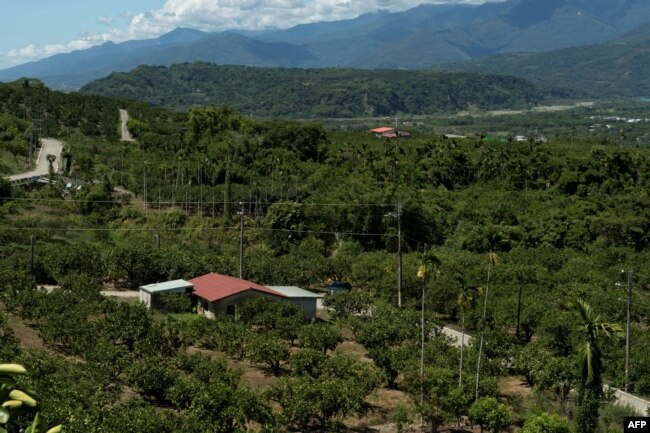
파일 - 2022년 8월 17일에 찍은 이 사진은 대만 화롄현의 루이수이 향에 있는 포멜로 농장을 보여줍니다.
FILE - This picture taken on Aug. 17, 2022 shows pomelo farms in Ruisui township, in Taiwan's Hualien county.
보조금과 농산물을 대체 시장으로 이동시키는 데 도움을 주기 위한 노력에도 불구하고, 일부 분석가들은 이러한 도전에 대한 대만 당국의 대응이 충분히 시의적절하지 못했을 수 있다고 말합니다.
Despite the subsidies and efforts to help redirect agricultural products to alternative markets, some analysts say the Taiwanese authorities’ response to the challenges may not have been timely enough.
"중국이 대만 파인애플의 수입을 금지한 후, 저는 당국에 중국의 잠재적인 장난감 금지에 대한 대응을 고려할 것을 촉구했습니다."라고 양안 농업 무역 전문가이자 "과일 정치"라는 책의 저자인 차오춘은 가오슝에서 VOA와의 인터뷰에서 말했습니다.
“After Beijing banned imports of Taiwanese pineapples, I urged authorities to consider preparing responses for a potential Chinese ban on atemoyas,” Chiao Chun, an expert on cross-strait agricultural trade and author of the book “Fruit Politics,” told VOA in an interview in Kaohsiung.
차오 대변인은 "그러나 중국의 아테모야 금지 조치에 대한 대만 당국의 대응은 여전히 너무 느렸고, 이로 인해 아테모야 농민들은 오늘날에도 힘든 상황에 처하게 됐다"고 덧붙였습니다.
“However, Taiwanese authorities’ response to China’s atemoya ban was still too slow, which leaves atemoya farmers in a tough situation even today,” Chiao added.
국내정책
Domestic policies
중국 시장에 크게 의존하는 대만 농산물에 대한 중국의 표적 제재는 대만 국내 정치에도 영향을 미쳤습니다.
China’s targeted sanctions on Taiwanese agricultural products that rely heavily on the Chinese market have also affected domestic politics in Taiwan.
타이퉁의 일부 농민들은 미국의소리(VOA) 방송에 이번 선거에서 중국에 우호적인 야당인 국민당(KMT)에 표를 던질 것이라고 말했습니다. 왜냐하면 이것이 중국이 대만으로부터의 모든 아테모야에 대한 수입 금지를 중단하는 유일한 방법이라고 믿기 때문입니다.
Some farmers in Taitung told VOA that they will vote for the China-friendly opposition party Kuomintang (KMT) in the upcoming election because they believe this is the only way to guarantee China will end import bans on all atemoyas from Taiwan.
하지만 Tsou는 대부분의 또래들과 다른 견해를 가지고 있습니다.
But Tsou holds a different view from most of his peers.
그는 미국의소리(VOA) 방송에 "토요일 선거 이후 정권 교체가 있으면 결과는 대부분의 아테모야 농부들이 직면한 상황에 변화를 줄 것"이라며 "토요일 선거에서 국민당이 승리하면 농부들은 중국 수출을 시작할 수 있다"고 말했습니다
“If there is regime change after the election on Saturday, the outcome will make a difference to the situation that most atemoya farmers face,” he told VOA. “Farmers can start exporting to China if the KMT wins the election on Saturday.”
그러나 그는 또한 대만 농부들이 특정 제품에 대한 수입 금지와 같은 강압적인 경제 조치에 더 취약하게 만들기 때문에 생계를 위해 누구에게도 의존해서는 안 된다고 생각합니다.
However, he also thinks Taiwanese farmers shouldn’t rely on anyone for their livelihood, since reliance will make them more vulnerable to coercive economic measures like import bans on certain products.
"농부들이 품질을 잘 관리하고 다양한 판매 채널을 구축하는 한, 그들은 사업을 유지하기 위해 반드시 수출에 의존할 필요는 없습니다."라고 Tsou는 말했습니다. "저는 민주주의가 여전히 더 중요하다고 생각합니다."
“As long as farmers take good care of the quality and establish different sales channels, they don’t necessarily need to rely on export to sustain their businesses,” Tsou said. “I think democracy is still more important.”
출처 : VOANews
댓글목록 0
등록된 댓글이 없습니다.




